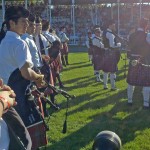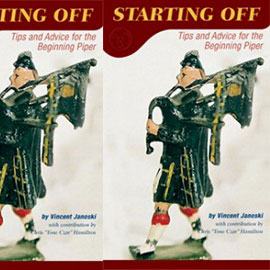The Path to Better Pipe Band Competitions
 We’ve all seen them. The Highland dancers and their entourages working hard off in the corner of the Highland games grounds. We pipers tend to ignore them but the path to better pipe band competition is found in their example. Eastern U.S. piping could learn a few things from the way those dancers structure their competitions. There is a high level of meaning and significance granted to many of these events that makes competing in them a special thing on the dancer’s part, inspiring improvement and instilling the drive to excel.
We’ve all seen them. The Highland dancers and their entourages working hard off in the corner of the Highland games grounds. We pipers tend to ignore them but the path to better pipe band competition is found in their example. Eastern U.S. piping could learn a few things from the way those dancers structure their competitions. There is a high level of meaning and significance granted to many of these events that makes competing in them a special thing on the dancer’s part, inspiring improvement and instilling the drive to excel.
Highland dance competitions have a competition structure that is managed and monitored by their Scottish parent board, the SOBHD, which governs all rules and standards for competitions. All competitions must run in accordance to the standards set by this body, much as it is with the EUSPBA in the eastern U.S. But unlike with the EUSPBA, there is an opportunity for some events to take it a bit further.
Any event can choose to elevate its significance and consider itself a “championship.” If a contest wants to become a championship, an application must be filed and certain things happen:
- The SOBHD records that championship on the official record and monitors it accordingly.
- The winners are recognized in Scotland on the official record. Winners are forever thus considered “champions” and sometimes receive official acknowledgment from the governing body.
- The contest itself must meet specific requirements to be considered a championship. They must have the required number of judges. Points must be tabulated a certain way to decide winners. There must be all age group categories offered with a minimum number of six competitors in each group.
- The event is closed and open to only those competitors who are at the premier level, and who dance set steps as established by the SOBHD each year.
It may seem like a lot, but it comes together easier than you think and many events have established themselves as championships for many years. Some competitions might never qualify to become championships because they either do not have the draw of competitors, a championship already exists in the region, or they do not have the financial resources or facilities to fulfill the requirements.
Does all of this sound familiar? All of this could easily apply to pipe band competition. In a sea of Highland games (more than 60 at last count), all of which obtain EUSBPA sanctioning equally, a pipe band looking for feedback is adrift with nothing to guide them or measure themselves against when seeking events with significance. All competitions have the same meaning since they are all run with the same content and standards. A good thing, mind you, and a real strength of the EUSPBA system. A pipe band can expect a certain standard is met at any games they choose to attend, but therein also lies the big weakness. A band can obtain “points” that have the same value whether they beat one band or twenty, whether bands meet once or ten times during the season, with the end result being the overall points becoming more like an attendance record rather than a reflection of musical success. Any band’s achievement is not given much significance since the achievement has the same flattened level of meaning wherever they go. In short, there is nothing to aspire to and pipe band competition becomes a “grind” that is as monotonous as much as it might be enjoyable. Bands only need to be just “good enough” to accrue points. The system itself is set up to encourage mediocrity.
If we were to create events that gave bands a reason to strive for greater excellence, what would they look like? If we followed the Highland dancing model, a true pipe band championship-level event here in the east might look like this:
- The event would be established at a single location, would be monitored, and tracked.
- The winners would receive official acknowledgement and recognition in the eyes of the community.
- The event would have a full complement of judges in each grade (perhaps more beyond the usual to suit the stature of the event)
- Every grade of competition would be offered with a minimum number of bands playing all of their required material in each grade, and with a set amount of regional representation.
It doesn’t take a huge leap to realize that any event would have to meet these requirements at a minimum before it could consider itself a true championship. Anything less diminishes the meaning and significance of the term. It also doesn’t require a huge amount of imagination to put together such an event. If a “championship” is to be considered special and meaningful, then it is measured by how closely it meets the basic requirements to make it so. Anything short of that is a waste of effort and funds or, put more plainly, is just another day out on the field.
 Pipehacker
Pipehacker








